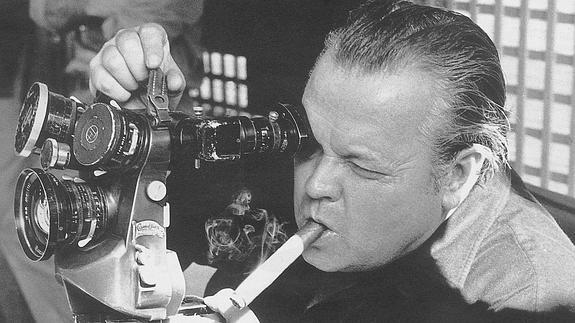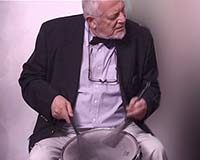-Harry`s Film Impressions (1)
De box looks at vun fellow, and de box says
“Yes, dot vun is for me!”
It looks at annoder, and it says, “Nawww!”
– Akim Tamiroff, as related by Orson Welles
Dying young means
being young for all eternity
Playing Marlene
Marlene Dietrich spent her life playing herself. Not even the most avid Marlene Dietrich fan would call her versatile. She was always good since Marlene Dietrich as a person was
interesting.
I never dreamt of being at close quarters with Marlene. She wasn’t my type. The plucked, penciled-in eyebrows, the taut skin and the squeezed-lemon look did not send me anywhere but to the cinema. I simply liked watching her. She had screen presence and charisma. Her savoir-faire and her cynicism appealed to me.

Marlene Dietrich, 1940
Joseph Sternberg discovered her and made a series of films with her, but when he went out of her life, there was a crisis. She never found another director like Sternberg, but she went on. Her career had its ups and downs, but whenever there was a down, it was followed by an up. And in the last phase, she was a caricature of herself. When roles became sparse, the caricature sang. She was the woman who was most often played by female impersonators. And actually she was a female impersonator herself. Not that she was masculine. But being a woman was part of the role she was playing. Of course, you couldn’t play her. You couldn’t play Bette Davis or Clark Gable or Gary Cooper either. Whenever there are biopics, the actors doing those roles fall flat. Could it be that the great stars were great? You can play Winston Churchill, Harry Truman and Golda Meier, but you can’t play a great star; you can merely impersonate him.
The real Marlene was the movie Marlene. Sure, she let her hair down when she wasn’t in front of the cameras, but the character was the same.
She had her greatest moment and spoke her greatest line in Touch of Evil. She says to Orson Welles, “You’re a mess, baby.”
How true that was! That line applies to the obese corrupt cop that Orson was playing, as well as to Welles himself. And it must have taken a lot of courage for Orson to have Marlene, who’s Marlene in a black wig, say that to him. But he knew that the scene would make cinema history, so he put it in the film. It may have been embarrassing to present such an accurate assessment of himself, but Orson was willing to sacrifice his vanity for the sake of art. At that stage, Orson was not at his prime, but he never ceased being the great artist that he was.
Marlene stayed true to herself in old age. She didn’t want her fans to see what time had done to her, so cameras were taboo. In Maximilian Schell’s Marlene, you just hear her voice. And the voice is true to the legend. Asked about an afterlife, she scoffs in her old cynical manner. “Who would be crazy enough to believe that there could be billions souls floating around up there?”
And what would have happened if the Deity had appeared to do the “doubting Thomas” routine with her? She’d just have said, “You’re a mess, baby.” And, by God, she’d be right! Marlene was never at a loss of words, and she didn’t need a script for them, so she might have added, “And, baby, you made a mess!”
Da Capo for Orson
Orson was a bad boy, but he was a Hollywood man, albeit a rebel. The Hollywood rebels like Brando and Dean were all Hollywood men.
When Orson finished directing Touch of Evil, he spent three months editing it in the cutting room. That was too much for the Universal moguls, and they took it out of his hands. And good old Orson said goodbye.
Of course, the result was not what Orson wanted. So here’s my question, why the Hell didn’t Orson take a copy of the film to keep?
This story smacks of the fate of The Magnificent Ambersons. But what happened in both cases was not completely Hollywood’s fault. Orson was to blame as wel for not sticking around.
The Future in Touch
A dialogue snippet from Touch of Evil:
Welles corrupt cop to Dietrich’s gypsy:
“You’ve been reading the cards, haven’t you?
What’s my future? Come on, read my future!”
Dietrich to Welles:
“You haven’t got any. Your future is all used up.”
Marlene Assesses the Deity
Marlene Dietrich had her greatest moment and spoke her greatest line in Touch of Evil.
She says to Orson Welles, “You’re a mess, baby.”
How true that was! That line applies to Captain Hank Quinlan, the obese corrupt cop that Orson was playing, as well as to Welles himself. And it must have taken a lot of courage for him to have Marlene say that to him.
Orson knew that the scene would make cinema history, so he put it in the film.
It is an assessment of the character, but, alas, also of the director. It must have been embarrassing to present such an accurate assessment of himself, but Orson was willing to sacrifice his vanity for the sake of art. At that stage, Orson was not at his prime, but he never ceased being the great artist that he was.
After her retirement, Marlene stayed true to herself in old age. She didn’t want her fans to see what time had done to her, so cameras were taboo.
In Maximilian Schell’s Marlene, you just hear her voice. And the voice is true to the legend.
Asked about an afterlife, she scoffs in her old cynical manner.
“Who would be crazy enough to believe that there could be billions souls floating around up there?”
And what would have happened if the Deity had appeared to do the “doubting Thomas” routine with her?
She’d just have said, “You’re a mess, baby.” And, by God, she’d be right!
Marlene was never at a loss of words, and she didn’t need a script for them, so she might have added, “And, baby, you made a mess!”

Orson Welles
Raising Kane
Raising Kane is impossible. He’s dies in the film, so you can’t raise him from the dead like we did with Frankenstein.
You can’t film a prequel to Citizen Kane because the film begins with Kane’s childhood, and you can‘t film a sequel since the film ends with his death. So The Return of Kane is out. The only other possibilities are The Son of Kane or Kane’s Daughter.
“What’s that? Kane died childless?
“Don’t be ridiculous! A son or daughter could very well show up. It wouldn’t be the first time progeny came out of the blue. The mother has to know – but not necessarily the father!
There was The Son of Monte Cristo, The Son of Robin Hood. The Son of Ali Baba and The Son of Frankenstein. There were sons galore, including the sons of King Kong and Godzilla. Ditto for daughters. There was The Daughter of Rosie O’Grady and The Daughter of Dr. Jekyll, So why shouldn’t there be The Son of Kane – and maybe a daughter-sequel to that.
The intellectual crowd is a cinch, since they’ll want to see how the Kane story develops. They’re not to be scoffed at. After all they keep Woody Allen afloat, don’t they? And we’ll make the film appealing to the average moviegoer. He wants to see a classy film, now and then, just to prove that he’s not a lowbrow.
“Now Listen! Kane was shot in black-and-white, and there was no nudity in those days. We’ll shoot the Son-film in color and spice it up with some undraped ladies. We’ll see to it that the sequel is even better than the original.
Junior will be modeled on Murdoch, but we’ll be sure to show his good side. That way, we’ll avoid the kind of trouble that Hearst caused for Welles.
How can we miss? This one will be in the bag. And then we’ll see what we can do with the daughter?
to be continued….
– Herbert Kuhner










 Users Today : 120
Users Today : 120 Users Yesterday : 107
Users Yesterday : 107 This Month : 516
This Month : 516 This Year : 7893
This Year : 7893 Total Users : 229029
Total Users : 229029 Views Today : 343
Views Today : 343 Total views : 1964856
Total views : 1964856 Who's Online : 2
Who's Online : 2




